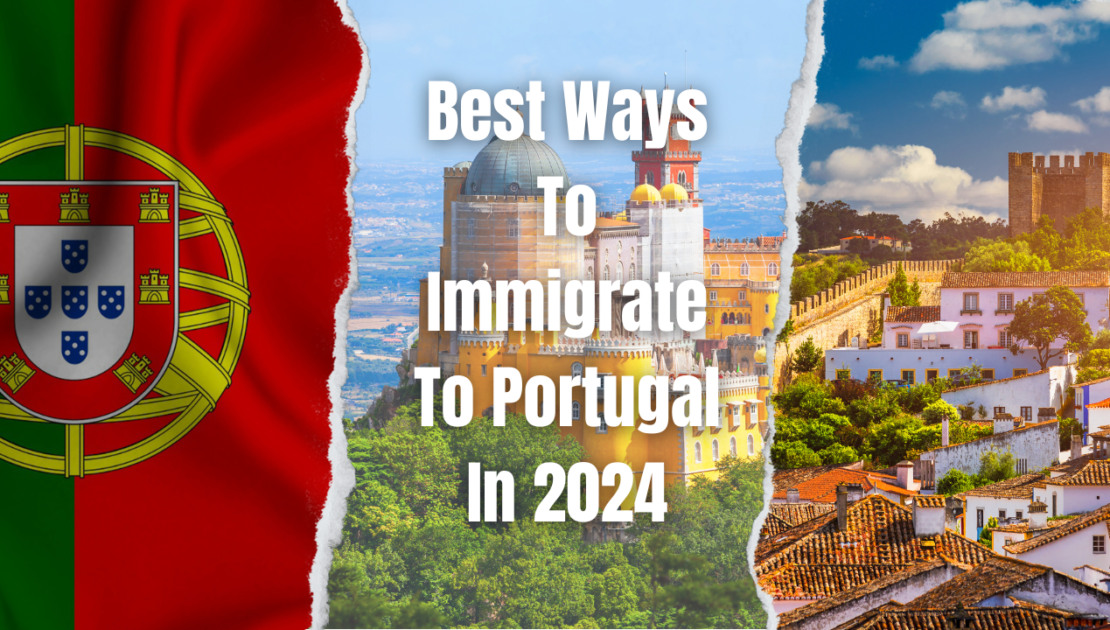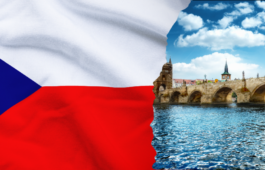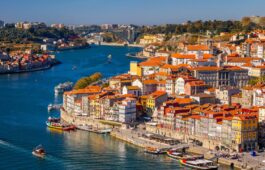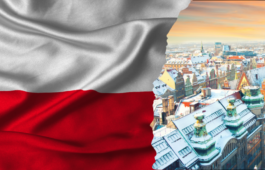- 11 May 2024
- Admin
- No Comments

Best ways to Immigrate to Portugal In 2024
Portugal, a country nestled on the Iberian Peninsula, captivates with its rich history, vibrant culture, and stunning landscapes. From the charming cobbled streets of Lisbon to the serene vineyards of the Douro Valley, Portugal offers a tapestry of experiences. Its coastal allure beckons with golden beaches along the Algarve and picturesque fishing villages like Cascais. A haven for food enthusiasts, Portugal tantalizes with its delectable cuisine, highlighted by fresh seafood and custard tarts known as pastéis de nata. With a blend of old-world charm and modern delights, Portugal warmly embraces visitors, inviting them to explore its treasures at every turn.
Moving to Portugal can be exciting and fulfilling, but it needs careful planning and knowing the immigration rules well. Here are some good ways to move to Portugal:
D7 Visa (Retirement or Passive Income Visa)
The D7 Visa stands as a favored option for retirees or individuals with passive income streams. Eligibility typically hinges on showcasing a consistent income source sustaining life in Portugal. This visa grants a one-year validity, with the possibility of annual renewal.
D8 Digital Nomad visa
Introduced in the autumn of 2022, the D8 visa is a recent addition to Portugal’s visa offerings. It grants Portuguese residency for either one or two years, contingent upon the specific variant pursued. Exclusively targeting digital nomads, the D8 visa accommodates individuals capable of earning income from any global location of their choice. A key eligibility criterion for this visa is demonstrating an average monthly income equivalent to approximately four times the prevailing Portuguese minimum wage, approximately 3600 euros. This initiative underscores Portugal’s commitment to embracing remote work and attracting individuals who can contribute to its dynamic and diverse economy.
D2 Visa (Entrepreneur Visa)
Considering starting a business or investing in Portugal? The D2 Visa is an appropriate choice. You’ll be required to present a detailed business plan, show adequate financial resources, and generate job opportunities for locals. Eligibility for the Entrepreneur Visa necessitates proving ample financial capacity to finance your business venture and sustain personal living expenses throughout your time in Portugal. Those who secure approval can later apply for permanent residency, offering a pathway to long-term settlement in the country.
Golden Visa Program
Tailored for non-European Union (EU) nationals, the Golden Visa Program targets investors in Portugal. Investment avenues range from real estate to job creation and capital transfers. Holding the Golden Visa for five years allows applicants to pursue permanent residency. However, due to its allure, the Portuguese government periodically introduces and enforces restrictions on the program. Staying informed about these evolving regulations is crucial for prospective applicants, as it ensures compliance with current requirements and maximizes the benefits of participation in the Golden Visa Program.
Family Reunification
Those seeking family reunification in Portugal may qualify if they have immediate family members who are Portuguese citizens or legal residents. Eligibility hinges on demonstrating a bona fide familial bond with a Portuguese citizen or resident. Immediate family members usually encompass spouses, children, and dependent parents. Supporting evidence, such as marriage certificates or birth certificates, is imperative to substantiate the familial connection. This process enables families to reunite under Portuguese law, fostering cohesion and unity while ensuring compliance with immigration regulations.
Student Visa
Considering studying in Portugal? You can initiate the process by applying for a student visa. This entails obtaining an acceptance letter from a Portuguese educational institution, confirming your enrollment in an academic program. Additionally, you must showcase adequate financial resources to cover tuition fees, living expenses, and health insurance throughout your stay in Portugal. This meticulous preparation ensures compliance with visa requirements and facilitates a smooth transition into academic life in Portugal.
Employment Visa
Securing employment in Portugal? Your employer can aid in securing an employment visa for you. Non-EU nationals seeking work in Portugal must apply for a Portugal Work Visa. Eligibility criteria include having a confirmed job offer from a Portuguese employer and the subsequent application for a Work Permit by your employer on your behalf. Typically, employment visas are linked to particular job roles and may necessitate renewal should you switch jobs. This process streamlines the transition into the Portuguese workforce while ensuring compliance with immigration regulations.
Talent and Highly Qualified Professional Programs
Portugal extends specialized visa programs aimed at enticing skilled professionals like researchers, scientists, and IT specialists. These initiatives often feature simplified visa procedures and advantageous terms. Among them, the Tech Visa program targets tech experts such as software developers and data scientists, enticing them to Portugal. Additionally, the StartUP Visa program caters to entrepreneurs and innovative startup founders, offering tailored support for their ventures. These visa programs underscore Portugal’s commitment to fostering innovation and attracting top talent in key sectors, contributing to the country’s economic growth and technological advancement.
Long-Term Resident EU Permit
Having legally resided in Portugal for five years under various residency visas, like a work visa, you might qualify to apply for a long-term resident EU permit, potentially leading to permanent residency. This permit marks a significant milestone on your journey to establishing a more enduring status in Portugal. For those aspiring to Portuguese citizenship, obtaining a Long-Term Resident EU Permit represents a crucial advancement. Following six years of legal residency in Portugal, you could become eligible to apply for citizenship, contingent upon meeting additional requirements such as displaying proficiency in the Portuguese language and passing a citizenship test.
IMPORTANT: Seek Legal Assistance
Given the complexity of immigration procedures, it’s advisable to seek legal guidance from an immigration attorney or consultant. Their expertise can assist you in comprehending the prerequisites, collecting essential paperwork, and navigating the application process smoothly.
IMPORTANT: Learn Portuguese
Although not consistently mandatory, proficiency in Portuguese can greatly aid integration and job prospects in Portugal. Enrolling in language courses can enhance your communication abilities. Keep in mind that immigration regulations evolve; thus, staying informed about the latest policies is essential. Regularly consult the official website of the Portuguese Immigration and Borders Service (SEF) and seek advice from the nearest Portuguese consulate or embassy in your home country. Each immigration pathway may entail distinct criteria and documentations, so tailor your application accordingly to your chosen route.
If Portugal has captured your heart as the ideal destination for living, studying, working, or investing, reach out to our team. We’ll assess your needs and recommend the immigration option that aligns best with your goals. Your journey in Portugal isn’t just about relocation; it’s about embarking on a new chapter brimming with opportunities, personal growth, and the enchantment of Portuguese experiences.










